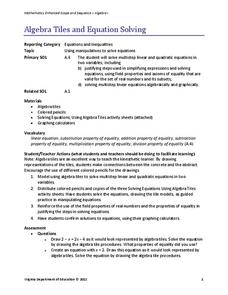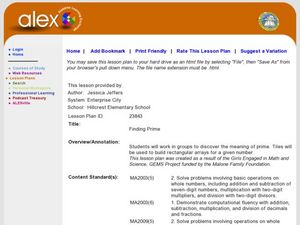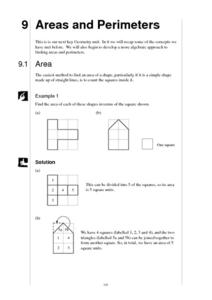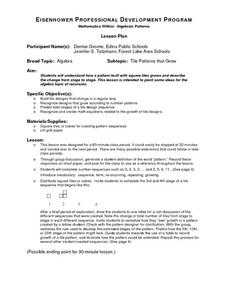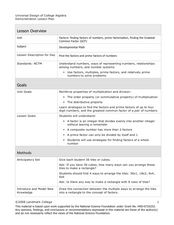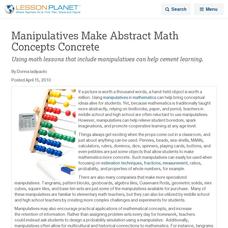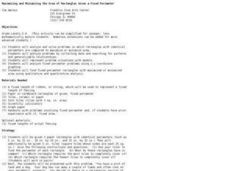Virginia Department of Education
Algebra Tiles and Solving Equations
Young mathematicians solve linear equations by drawing models of algebra tiles using colored pencils. To finish, they solve the same equations algebraically and check their answers using a graphing calculator.
Virginia Department of Education
Evaluating and Simplifying Expressions
Discover how algebra tiles help evaluate expressions. Scholars learn to use algebra tiles to substitute values in for variables and evaluate expressions. The included worksheet contains a set of evaluation problems to assess individuals'...
Buffalo State
Adding and Subtracting Integers Unit
Just because one integer is larger than another doesn't mean it will make sense right away. Go beyond note taking and show learners, through the use of algebra tiles and a Four-Pan Algebra Balance, how the numbers relate to one...
Alabama Learning Exchange
Finding Prime
Fifth and sixth graders explore prime numbers. They work with a partner to build rectangular arrays using twelve tiles. Factor pairs are noted and recorded on graph paper. Pupils construct rectangular arrays with a prime number and...
Curated OER
Miles of Tiles - The Pool Border Problem
Students recognize patterns and represent situations using algebraic notation and variables. In this variables and patterns lesson plan, students identify a pattern involving the number of tiles required to form a border around a pool...
Centre for Innovation in Mamatics Teaching
Areas and Perimeters
Cover some serious area in your geometry curriculum with this collection of worksheets. After first introducing the concept of area using the tiling method, this resource continues on to teach learners how to use...
Curated OER
Evaluating Expressions Using Tiles
Sixth graders are shown a variety of algebraic equations. In groups, they use tiles to represent each expression in the equations. To end the lesson, they solve story problems with one and two unknown variables. Individuals share their...
Curated OER
Incredible Integers!
There are three parts to this lesson on integers. In the first, learners explore positive and negative numbers on an actual painter's tape number line and by playing a "Hot Seat" game. In part two, they view a BrainPop video and work...
Curated OER
"BATS on Parade" by Kathi Appelt
Middle schoolers visualize polynomials using algebra tiles.
Curated OER
The New Texas Two-Step
Sixth graders work with mathematical expressions by interpreting, analyzing and problem solving with them. In this two step algebraic problem solving lesson, 6th graders use algebra tiles to solve equations.
Curated OER
Writing Number Sentences
Students practice writing number sentences. After reading real world problems, they describe the same situation by writing a number sentence. Students use algebra tiles, or counters, to demonstrate the use zero pairs in solving...
Mathematics Vision Project
Module 1: Getting Ready Module
This fabulous resource is a must-have for any algebra teacher's arsenal of lessons. Developing the idea of equations and use of variables from basic physical scenarios, learners gain valuable intuition in the structure and meaning of...
Curated OER
Algebra: Evaluating Expressions Using Tiles
Sixth graders evaluate algebraic expressions. In this introduction to algebra lesson plan, 6th graders use manipulatives (algebra tiles) to solve problems involving one and two variables. Students apply this knowledge to real life...
Curated OER
Tile Patterns that Grow
Students explore how a pattern built with square tiles grows and describe the change from stage to stage. They predict later stages of a tile design sequence and create math equations related to the growth of tile designs.
Curated OER
Two Step Equations
Sixth graders solve multiple step math problems. In this problem solving lesson, 6th graders practice following step by step instructions such as making cookies or building a snowman. Students use algebra tiles and draw pictures to solve...
Curated OER
Inequalities and The Order of Operations
Middle and high schoolers investigate how to solve inequalities. The lesson has a good guide for taking pupils through a direct instruction of the concept. You can use counting tiles in order to help kinesthetic learners.
National Security Agency
A Balancing Act: Solving Multi-Step Equations
Wow! Put on that thinking cap and solve multi-step equations. To solve equations, learners review the use of the distributive property and combining like terms. This three-day lesson comes with about 20 pages of worksheets, warm-ups,...
CK-12 Foundation
Visual Patterns: Building the Queen's Tower
A resource fit for a queen. Scholars recognize and continue a pattern in towers people are building for a queen. They write and use an algebraic expression for the number of tiles in the towers.
Curated OER
Find the Factors and Prime Factors
Show the class how to find the factors of numbers. They use a variety of strategies, including unifix cubes, to find the factors of a whole number. This resource includes clear procedure to follow. Included are an anticipatory set,...
National Security Agency
Introducing Integers and Their Operations
There's nothing negative about this mini-unit on integers! Engaging young mathematicians in a series of hands-on activities and collaborative learning opportunities, this resource offers an excellent way to introduce your class...
Curated OER
Manipulatives Make Abstract Math Concepts Concrete
Using math lessons that include manipulatives can help cement learning.
Curated OER
Finding Patterns in Tiles
Learners explore perimeter and area of rectangles. In this rectangular instructional activity, students use tiles to discover the formulas for perimeter and area. Learners solve for area.
Curated OER
Maximizing and Minimizing the Area of Rectangles Given a Fixed Perimeter
Students explore the realms of measurement. In this math lesson plan, students analyze and solve problems in which rectangles with identical perimeters are compared to maximize or minimize area. This lesson can be extended for algebra,...
Curated OER
Adding Ten Tiles I
Students practice this problem that needs a certain amount of experimentation (trial and error) to get any answer at all. In the process they practice their basic number facts. However, to get the complete set of answers Students need to...
